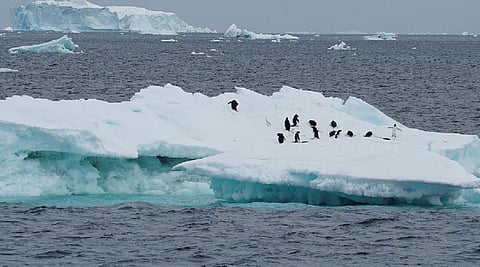

New Delhi | Record-low levels of sea ice around Antarctica in 2023 was made at least four times more likely by climate change, new research has found.
In July 2023, the extent of Antarctic sea ice during winter fell to its lowest since satellite records began in late 1978, with about 2.5 million square kilometres less than usual.
Researchers, led by those at the British Antarctic Survey (BAS), investigated the probability of such a significant reduction in sea ice and the role of climate change in making this event more likely to happen.
Using climate datasets and models, the team found that Antarctic sea ice reaching historic lows would occur only once in over 2,000 years, or was "extremely unlikely" without climate change, which made the event more than four times likelier. Global climate model data from the Coupled Model Intercomparison Project Phase 6, or CMIP6, was used for analysis.
"This is the first time this large set of climate models has been used to find out how unlikely 2023's low sea ice actually was. We only have 45 years of satellite measurements of sea ice, which makes it extremely difficult to evaluate changes in sea ice extent. This is where climate models come into their own," Rachel Diamond, BAS, lead author of the study published in the journal Geophysical Research Letters, said.
"According to the models, the record-breaking minimum sea ice extent would be a one-in-a-2000-year event without climate change. This tells us that the event was very extreme -- anything less than one-in-100 is considered exceptionally unlikely," Diamond said.
